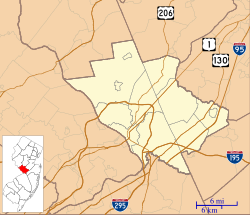Princeton Law School
Ivy Hall | |
 Ivy Hall, built to house the law school, later home to The Ivy Club, to which it gave its name, and now home to the choir of Trinity Church, Princeton | |
| Location | Mercer and Alexander St, Princeton, New Jersey |
|---|---|
| Coordinates | 40°20′48.2″N 74°39′53.5″W / 40.346722°N 74.664861°W |
| Built | 1846 |
| Architect | John Notman[1] |
| Architectural style | Italianate |
| Part of | Princeton Historic District (ID75001143) |
| Added to NRHP | June 27, 1975 |
The Law School at the College of New Jersey (now Princeton University) was a department of Princeton University from 1847 until 1852.
History
[edit]In the 1820s, an attempt was made to organize teaching in law, but this plan ended following the death of the designated professor.
The Law School at the College of New Jersey began instruction in 1847 as a modest effort consisting of three professors: Joseph Coerten Hornblower, Richard Stockton Field, and James S. Green.[2] Only seven students obtained a law degree before the school closed in 1852. The short-lived experiment was the furthest the university got in a recurring ambition, marked by varying levels of effort, to establish a law school.
In 1890, Princeton President Francis Landey Patton lamented that Princeton had faculties of philosophy and theology but needed to send Princeton graduates to Harvard or Columbia to study law.[2]
From 1923 to 1925, the university once again formed appreciable plans for the start of a law school but abandoned the idea due to cost and financial risk.[2] In 1974, then president of Princeton, William G. Bowen, selected a committee to investigate and advise on the achievability of a law school.[3] The committee recommended plans for a law school be deferred after citing high construction costs.
Besides Princeton, Brown and Dartmouth are the two other Ivy League schools to lack a law school.
Law at Princeton University today
[edit]Through its Princeton School of Public and International Affairs, Princeton maintains a program in law and public policy as well as a program in criminal justice.[4][5]
Though formally housed in the department of politics, Robert P. George also holds the title of professor of jurisprudence.[6]
Princeton University does award honorary degrees of law. Sonia Sotomayor, then Circuit Judge of the United States Court of Appeals for the Second Circuit and currently Associate Justice of the Supreme Court of the United States, received an Honorary Doctor of Laws Degree from Princeton University.[7]
Mistaken and fictional references
[edit]At a press conference of law school deans in 1998 decrying the annual US News Law School Rankings, then New York University School of Law Dean John Sexton quipped, "If they were asked about Princeton Law School, it would appear on the top 20 -- but it doesn't exist"[8] Sexton was denouncing the US News usage of reputation survey results from judges, lawyers and law school deans in its ranking formula, expressing doubt over the expertise of some surveyed.
A 2003 National Review Online commentary blundered when the author, Candace de Russy, identified the law school at Princeton as real: "These yearnings are embodied in a doctrine called ‘transnational progressivism,’ which is gaining prominence in law schools, for example, at Princeton and Rutgers".[9]
Similarly, during the Senate Judiciary Committee vote for Supreme Court nominee Samuel Alito, Sen. Richard Durbin attested that now Justice Alito hailed from "Princeton Law." Alito attended Princeton University for his undergraduate studies, but received his law degree from Yale Law School.
References
[edit]- ^ Dallett, Francis James (1959). "John Notman, Architect". The Princeton University Library Chronicle. 20 (3): 133. doi:10.2307/26403286. Retrieved 15 November 2023.
- ^ a b c "Is or was there a Princeton Law School? Not really!". University Archives. 2014-10-13. Retrieved 2025-01-20.
- ^ Times, Maxine Lipeles Special to The New York (1974-12-29). "Princeton Weighing Law School Plan". The New York Times. ISSN 0362-4331. Retrieved 2025-01-20.
- ^ "Executive Committee | Program in Law and Public Policy". plaw.law.princeton.edu. Retrieved 2025-01-20.
- ^ "Criminal Justice @ SPIA". criminaljustice.spia.princeton.edu. Retrieved 2025-01-20.
- ^ "Robert P. George | Princeton Politics". politics.princeton.edu. Retrieved 2025-01-20.
- ^ "Seven leaders in arts, humanities, sciences and public affairs receive honorary degrees" (Press release). Princeton University. 2001-06-05. Retrieved 2011-09-27.
- ^ Hoffman, Jan (1998-02-19). "Judge Not, Law Schools Demand Of a Magazine That Ranks Them". The New York Times. ISSN 0362-4331. Retrieved 2025-01-20.
- ^ Candace de Russy (2003-04-07). "Liberate the Universities". National Review Online. Archived from the original on 2003-04-07. Retrieved 2011-09-27.
Sources
[edit]- Leitch, Alexander (1978). A Princeton Companion. Princeton University Press. ISBN 0-691-04654-9.




